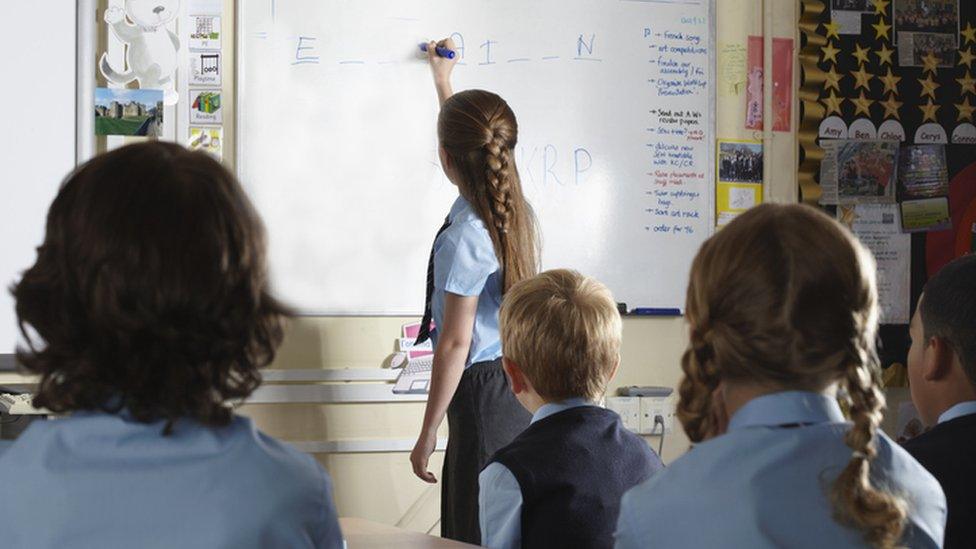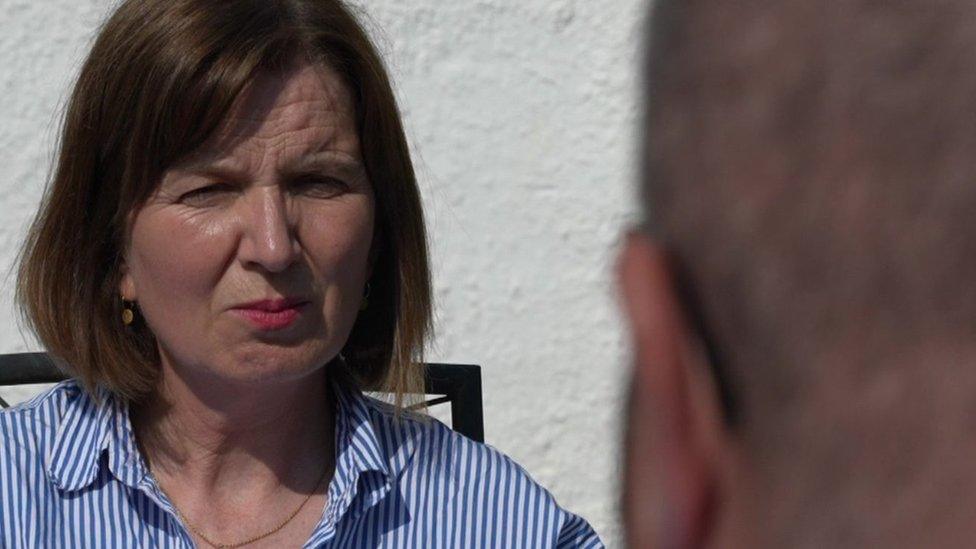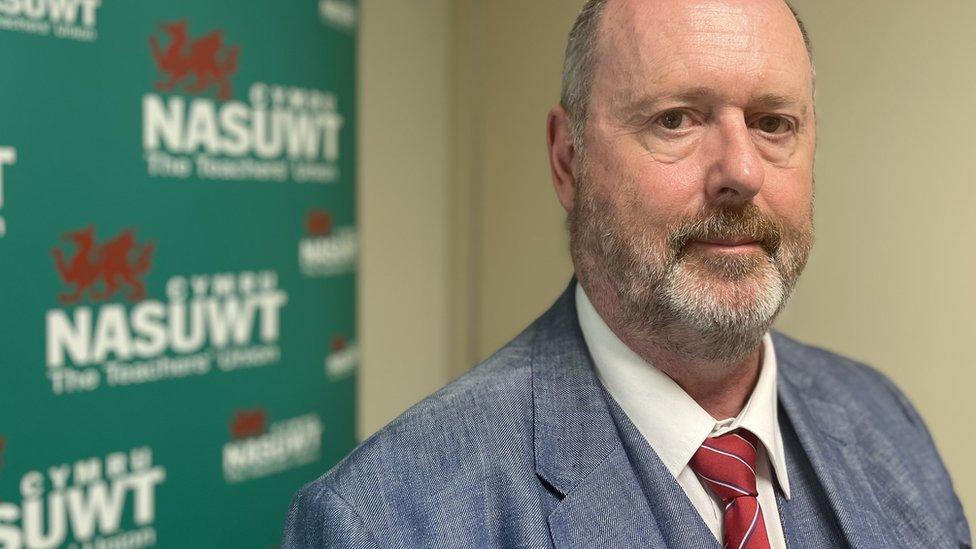Violence against teachers cases tip of iceberg - union
- Published

The NASUWT teaching union believes the level of violence against school staff is increasing
Thousands of cases of classroom violence recorded in Wales are "the tip of the iceberg", a union has said.
One special school teacher, who wanted to remain anonymous, said he had been assaulted numerous times: "Spat at, punched, headbutted, kicked, bitten."
The NASUWT said systems for reporting aggression were "a mess" and staff who were targeted felt unsupported.
Data obtained by Welsh Tories suggests at least 5,000 recorded violence cases against school staff from 2018 to 2022.
Conservatives have called for a national helpline for staff and new guidance on collecting data.
The Welsh government said any abuse of staff was "completely unacceptable", while the Welsh Local Government Association (WLGA) said councils were supportive of all school staff.
Wales' education minister Jeremy Miles told BBC Radio Wales on Thursday that every single school should be a welcoming environment to go to work and a safe environment for staff and for pupils.
The anonymous teacher said: "Colleagues have had hair set on fire.
"Pupils have violently attacked staff. Not just a single punch, but have continually gone at them.
"Not all management will admit what is going on in their school."
He said the impact was even worse "when you don't feel supported by your managers."
Acknowledging that the reasons for violent behaviour were complex, he said delays for mental health assessments and treatment for young people played a part.
The teacher believed the influence of pranks on social media and tiredness after staying up all night on phones can be factors too.

"Not all management will admit what is going on in their school," a teacher tells Bethan Lewis
He said some colleagues in primary and secondary schools had experienced similar incidents.
Working with children with behavioural challenges in a special school should not mean assaults come with the territory, he said.
"I'm a teacher just like anybody else. I work in this environment because they're the most vulnerable."
It should be "the most rewarding", supporting the pupils "we can help the most," he added.
Another teacher from Swansea who spoke of receiving abuse told BBC Radio Wales a pupil swore at him repeatedly after he asked him to remove his Airpods in a lesson.
"Why has this become an everyday occurrence in Wales where teachers have zero powers to do anything about it?" he asked. "In the health service they have a zero tolerance policy for abuse. But not in education."
Responses to Freedom of Information requests by Welsh Conservatives showed at least 5,000 incidents of violence against staff were recorded by local authorities between 2018 and 2022.
Some councils included data for incidents in special schools and pupil referral units as well as mainstream settings, while others did not specify.
Several local authorities said they had provided data only for physical assaults, but it was not clear whether others had included verbal assaults too.
Of the councils that responded, three - Flintshire, Torfaen and Pembrokeshire - said they did not hold data on aggression towards staff, but schools would or might have the information.

Violence has "been bad for a good few years, but it's getting worse," says Neil Butler of the NASUWT
Some councils, including Carmarthenshire, provided more detailed information about the type of violence and aggression experienced by staff and the settings where it had occurred.
The Conservatives' education spokesperson Laura Anne Jones called the figures "highly concerning" and claimed it was "a hidden crisis with the Welsh government failing to ever mention this crisis or bring these figures to light".
She said: "The Welsh government have allowed this to turn into a full-blown crisis and it's taken my office and I digging up these statistics for the issue to even be acknowledged.
"To make this situation worse in Wales we have no reporting standard and no requirement to report abuse or violence in the classroom. So, the thousands of incidents we already know about are just the tip of the iceberg and the actual picture is probably far far worse in reality."
The NASUWT said it believed the level of violence against education staff was accelerating, and the impact of the pandemic on young people could be a reason.
"It's been bad for a good few years, but it's getting worse," said Neil Butler, the union's national official for Wales.
'Reacting with aggression'
"Part of the problem there is that lack of recognition. So our members are fending off this violence every day in schools across Wales and feeling particularly unsupported."
He said the situation was "increasing the numbers who want to leave" the profession, and there was a need for more staff to offer one-to-one support for learners who are struggling and reacting with aggression.
"Before even that though you've got to get the figures right," he added.
"At the moment it's a mess in terms of how the figures are reported - different employers seem to take it more seriously than others, some are recording it, some are not.
"We need to know what the extent of the problem is, where the problem is so they can focus those resources down on the schools that need the help."
Earlier this year the Senedd's children, young people and education committee wrote to Education Minister Jeremy Miles, raising concerns about evidence it heard from councils and unions.
The WLGA had told the committee that local authorities have seen a rise in exclusions over the last academic year and "a large proportion of these have been related to incidents of verbal and physical aggression to staff from pupils".
The Welsh government said in a statement any form of violence or abuse against staff in our schools was "completely unacceptable".
"Schools must be safe and welcoming environments where teachers can get on with their jobs, helping pupils achieve the best they can.
"There is a duty on local authorities and schools to ensure schools are a safe environment for all," it said.
"If at any point the environment within a school becomes unsafe, the school should ensure that the relevant authorities are informed so that appropriate support can be made available," the statement added.
Mr Miles said it was important to understand the scale of the problem and the underlying issues in order to tackle it properly.
Related topics
- Published10 November 2019

- Published1 June 2018
